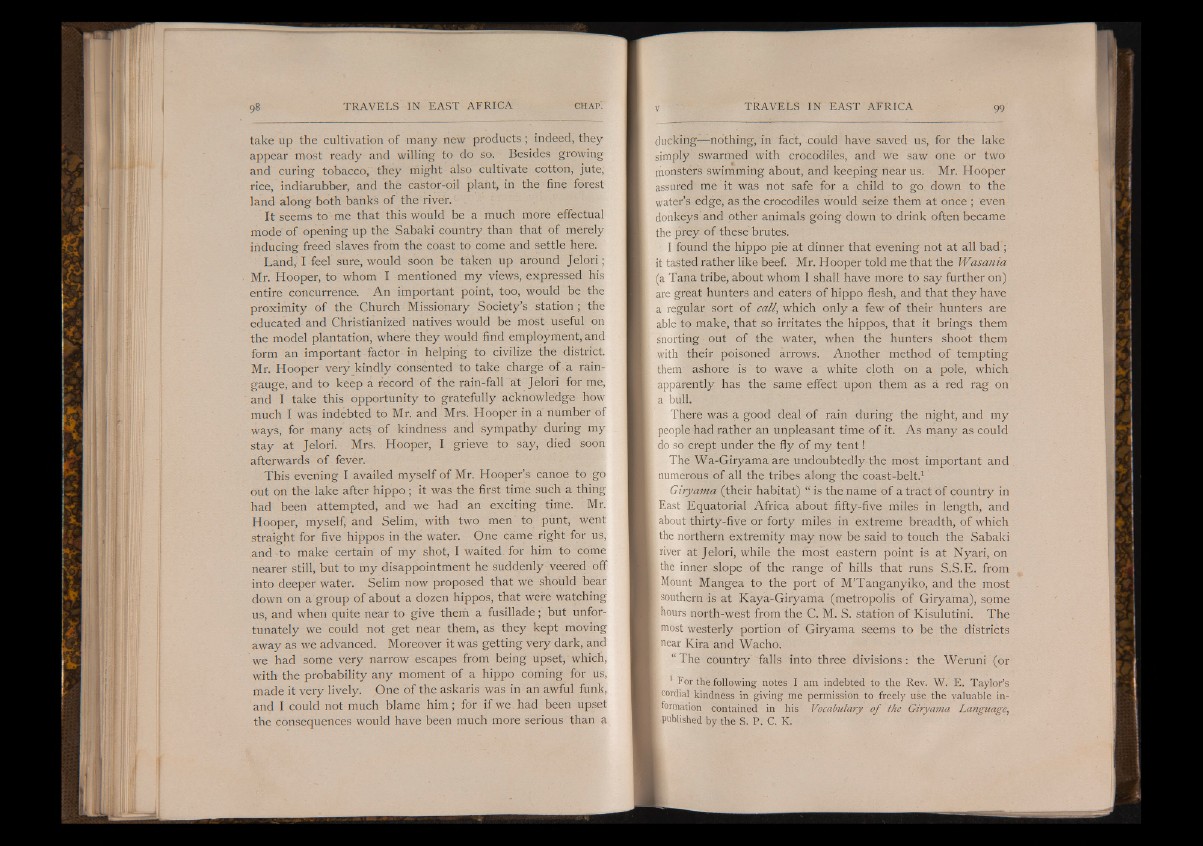
take up the cultivation of many new products; indeed, they
appear most ready and willing to do so. Besides growing
and curing tobacco, they might also cultivate cotton, jute,
rice, indiarubber, and the castor-oil plant, in the fine forest
land along both banks of the river.
It seems to me that this would be a much more effectual
mode of opening up the Sabaki country than that of merely
inducing freed slaves from the coast to come and settle here.
Land, I feel sure, would soon be taken up around Jelori;
Mr. Hooper, to whom I mentioned my views, expressed his
entire concurrence. An important point, too, would be the
proximity of the Church Missionary Society’s station ; the
educated and Christianized natives would be most useful on
the model plantation, where they would find employment, and
form an important factor- in helping to civilize the district.
Mr. Hooper very kindly consented to take charge of a rain-
gauge, and to keep a record of the rain-fall at Jelori for me,
and I take this opportunity to gratefully acknowledge how
much I was indebted to Mr. and Mrs. Hooper in a number of
ways, for many acts, of kindness and sympathy during my
stay at Jelori. Mrs. Hooper, I grieve to say, died soon
afterwards of fever.
This evening I availed myself of Mr. Hooper’s canoe to go
out on the lake after hippo; it was the first time such a thing
had been attempted, and we had an exciting time. Mr.
Hooper, myself, and Selim, with two men to punt, went
straight for five hippos in the water. One came right for us,
and - to make certain of my shot, I waited for him to C Q m e
nearer still, but to my disappointment he suddenly veered off
into deeper water. Selim now proposed that we should bear
down on a group of about a dozen hippos, that were watching
us, and when quite near to give them a fusillade; but unfortunately
we could not get near them, as they kept moving
away as we advanced. Moreover it was getting very dark, and
we had some very narrow escapes from being upset, which,
with the probability any moment of a hippo coming for us,
made it very lively. One of the askaris was in an awful funk,
and I could not much blame him; for if we had been upset
the consequences would have been much more serious than a
' ducking— nothing, in fact, could have saved us, for the lake
simply swarmed with crocodiles, and we saw one or two
monsters swimming about, and keeping near us. Mr. Hooper
assured me it was not safe for a child to go down to the
water’s edge, as the crocodiles would seize them at once; even
I donkeys and other animals going down to drink often became
the prey of these brutes.
I found the hippo pie at dinner that evening not at all bad ;
| it tasted rather like beef. Mr. Hooper told me that the Wasania
[ (a Tana tribe, about whom I shall have more to say further on)
| are great hunters and eaters of hippo flesh, and that they have
I a regular sort of call, which only a few of their hunters are
| able to make, that so irritates the hippos, that it brings them
1 snorting out of the water, when the hunters shoot them
I with their poisoned arrows. Another method of tempting
I them ashore is to wave a white cloth on a pole, which
I apparently has the same effect upon them as a red rag on
I a bull.
There was a good deal of rain during the night, and my
I people had rather an unpleasant time of it. As many as could
I do so crept under the fly of my tent!
The Wa-Giryama are undoubtedly the most important and
I numerous of all the tribes along the coast-belt.1
Giryama (their habitat) “ is the name of a tract of country in
■ East Equatorial Africa about fifty-five miles in length, and
I about thirty-five or forty miles in extreme breadth, of which
I the northern extremity may now be said to touch the Sabaki
B river at Jelori, while the most eastern point is at Nyari, on
■ the inner slope of the range of hills that runs S.S.E. from
■ Mount Mangea to the port of M’Tanganyiko, and the most
I southern is at Kaya-Giryama (metropolis of Giryama), some
I hours north-west from the C. M. S. station of Kisulutini. The
■ most westerly portion of Giryama seems to be the districts
■near Kira and Wacho.
“ The country falls into three divisions : the Weruni (or
1 For the following notes I am indebted to the Rev. W. E. Taylor’s
■cordial kindness in giving me permission to freely use the valuable in-
I lunation contained in his Vocabulary o f the Giryama Language,
■published by the S. P. C. K.